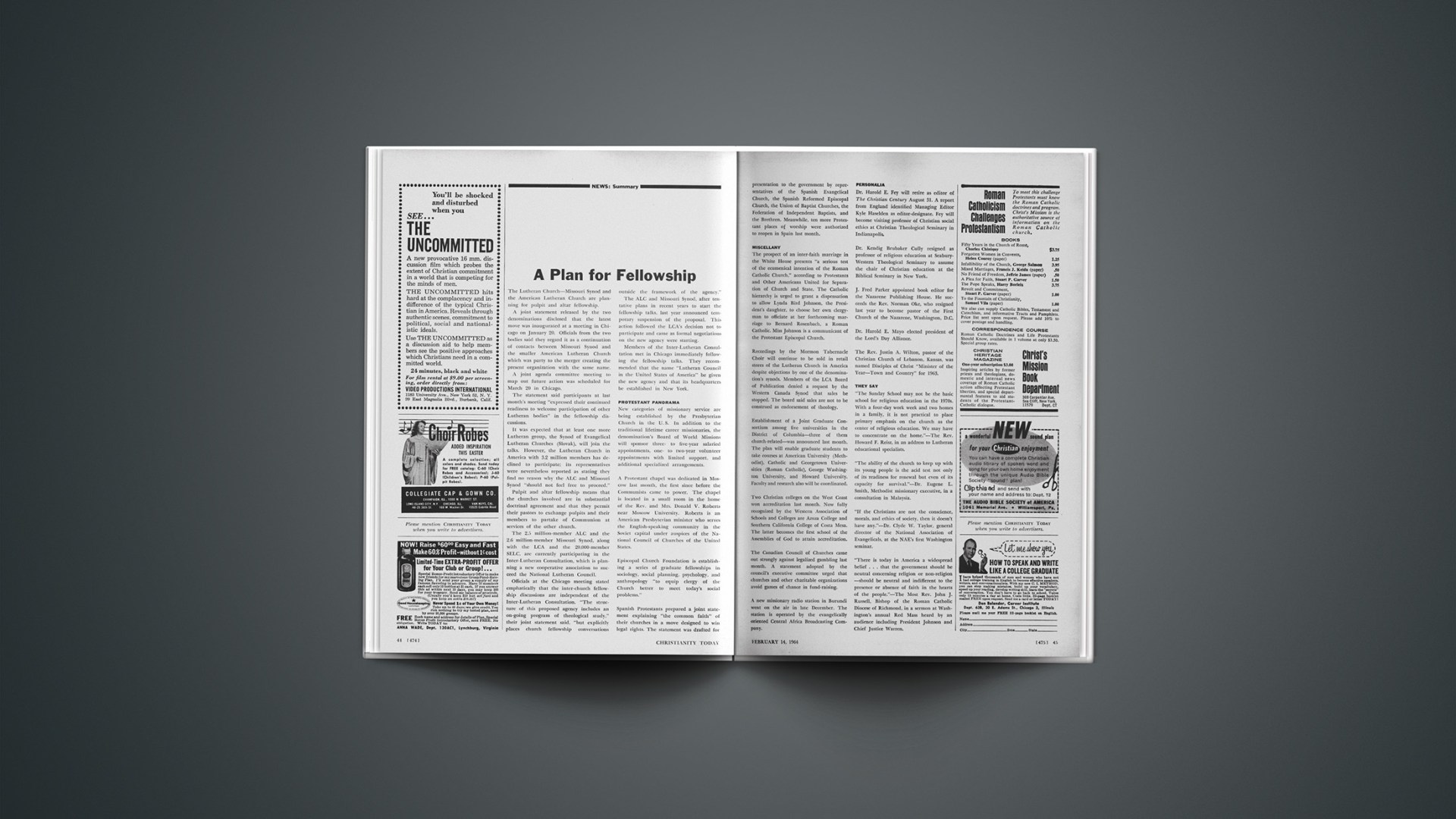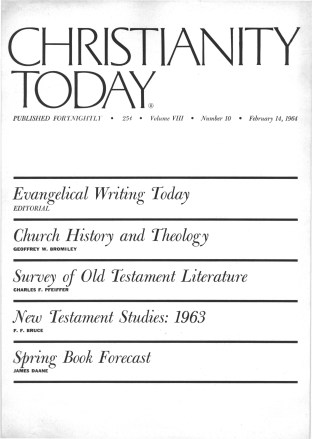The Lutheran Church—Missouri Synod and the American Lutheran Church are planning for pulpit and altar fellowship.
A joint statement released by the two denominations disclosed that the latest move was inaugurated at a meeting in Chicago on January 20. Officials from the two bodies said they regard it as a continuation of contacts between Missouri Synod and the smaller American Lutheran Church which was party to the merger creating the present organization with the same name.
A joint agenda committee meeting to map out future action was scheduled for March 20 in Chicago.
The statement said participants at last month’s meeting “expressed their continued readiness to welcome participation of other Lutheran bodies” in the fellowship discussions.
It was expected that at least one more Lutheran group, the Synod of Evangelical Lutheran Churches (Slovak), will join the talks. However, the Lutheran Church in America with 3.2 million members has declined to participate; its representatives were nevertheless reported as stating they find no reason why the ALC and Missouri Synod “should not feel free to proceed.”
Pulpit and altar fellowship means that the churches involved are in substantial doctrinal agreement and that they permit their pastors to exchange pulpits and their members to partake of Communion at services of the other church.
The 2.5 million-member ALC and the 2.6 million-member Missouri Synod, along with the LCA and the 20,000-member SELC, are currently participating in the Inter-Lutheran Consultation, which is planning a new cooperative association to succeed the National Lutheran Council.
Officials at the Chicago meeting stated emphatically that the inter-church fellowship discussions are independent of the Inter-Lutheran Consultation. “The structure of this proposed agency includes an on-going program of theological study,” their joint statement said, “but explicitly places church fellowship conversations outside the framework of the agency.”
The ALC and Missouri Synod, after tentative plans in recent years to start the fellowship talks, last year announced temporary suspension of the proposal. This action followed the LCA’s decision not to participate and came as formal negotiations on the new agency were starting.
Members of the Inter-Lutheran Consultation met in Chicago immediately following the fellowship talks. They recommended that the name “Lutheran Council in the United States of America” be given the new agency and that its headquarters be established in New York.
Protestant Panorama
New categories of missionary service are being established by the Presbyterian Church in the U. S. In addition to the traditional lifetime career missionaries, the denomination’s Board of World Missions will sponsor three to five-year salaried appointments, one to two-year volunteer appointments with limited support, and additional specialized arrangements.
A Protestant chapel was dedicated in Moscow last month, the first since before the Communists came to power. The chapel is located in a small room in the home of the Rev. and Mrs. Donald V. Roberts near Moscow University. Roberts is an American Presbyterian minister who serves the English-speaking community in the Soviet capital under auspices of the National Council of Churches of the United States.
Episcopal Church Foundation is establishing a series of graduate fellowships in sociology, social planning, psychology, and anthropology “to equip clergy of the Church better to meet today’s social problems.”
Spanish Protestants prepared a joint statement explaining “the common faith” of their churches in a move designed to win legal rights. The statement was drafted for presentation to the government by representatives of the Spanish Evangelical Church, the Spanish Reformed Episcopal Church, the Union of Baptist Churches, the Federation of Independent Baptists, and the Brethren. Meanwhile, ten more Protestant places of worship were authorized to reopen in Spain last month.
Miscellany
The prospect of an inter-faith marriage in the White House presents “a serious test of the ecumenical intention of the Roman Catholic Church,” according to Protestants and Other Americans United for Separation of Church and State. The Catholic hierarchy is urged to grant a dispensation to allow Lynda Bird Johnson, the President’s daughter, to choose her own clergyman to officiate at her forthcoming marriage to Bernard Rosenbach, a Roman Catholic. Miss Johnson is a communicant of the Protestant Episcopal Church.
Recordings by the Mormon Tabernacle Choir will continue to be sold in retail stores of the Lutheran Church in America despite objections by one of the denomination’s synods. Members of the LCA Board of Publication denied a request by the Western Canada Synod that sales be stopped. The board said sales are not to be construed as endorsement of theology.
Establishment of a Joint Graduate Consortium among five universities in the District of Columbia—three of them church-related—was announced last month. The plan will enable graduate students to take courses at American University (Methodist), Catholic and Georgetown Universities (Roman Catholic), George Washington University, and Howard University. Faculty and research also will be coordinated.
Two Christian colleges on the West Coast won accreditation last month. Now fully recognized by the Western Association of Schools and Colleges are Azuza College and Southern California College of Costa Mesa. The latter becomes the first school of the Assemblies of God to attain accreditation.
The Canadian Council of Churches came out strongly against legalized gambling last month. A statement adopted by the council’s executive committee urged that churches and other charitable organizations avoid games of chance in fund-raising.
A new missionary radio station in Burundi went on the air in late December. The station is operated by the evangelically oriented Central Africa Broadcasting Company.
Personalia
Dr. Harold E. Fey will retire as editor of The Christian Century August 31. A report from England identified Managing Editor Kyle Haselden as editor-designate. Fey will become visiting professor of Christian social ethics at Christian Theological Seminary in Indianapolis.
Dr. Kendig Brubaker Cully resigned as professor of religious education at Seabury-Western Theological Seminary to assume the chair of Christian education at the Biblical Seminary in New York.
J. Fred Parker appointed book editor for the Nazarene Publishing House. He succeeds the Rev. Norman Oke, who resigned last year to become pastor of the First Church of the Nazarene, Washington, D.C.
Dr. Harold E. Mayo elected president of the Lord’s Day Alliance.
The Rev. Justin A. Wilton, pastor of the Christian Church of Lebanon, Kansas, was named Disciples of Christ “Minister of the Year—Town and Country” for 1963.
They Say
“The Sunday School may not be the basic school for religious education in the 1970s. With a four-day work week and two homes in a family, it is not practical to place primary emphasis on the church as the center of religious education. We may have to concentrate on the home.”—The Rev. Howard F. Reisz, in an address to Lutheran educational specialists.
“The ability of the church to keep up with its young people is the acid test not only of its readiness for renewal but even of its capacity for survival.”—Dr. Eugene L. Smith, Methodist missionary executive, in a consultation in Malaysia.
“If the Christians are not the conscience, morals, and ethics of society, then it doesn’t have any.”—Dr. Clyde W. Taylor, general director of the National Association of Evangelicals, at the NAE’s first Washington seminar.
“There is today in America a widespread belief … that the government should be neutral concerning religion or non-religion—should be neutral and indifferent to the presence or absence of faith in the hearts of the people.”—The Most Rev. John J. Russell, Bishop of the Roman Catholic Diocese of Richmond, in a sermon at Washington’s annual Red Mass heard by an audience including President Johnson and Chief Justice Warren.










